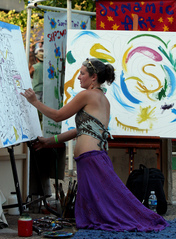 June, 2013 I’m sometimes asked why I write. Most artists ask themselves the same question, from time to time, about what they do. Really, why do we bother? It’s a pretty lonely and thankless job without many financial rewards. Obviously, there must be a higher purpose. You may have heard versions of these very insightful responses to the “why” question: “To bring order out of chaos.” “To try to make sense of the world I live in.” “I’m striving for truth and beauty.” “Because I have an urge to get my ideas out.” “It fulfills me.” “To communicate and share with a larger audience.” “To make the world a better place. It’s an act of love.” Any of these are fitting responses for why I write, whether it be fiction, non-fiction, poetry or drama. Most significantly, all of these responses express aspects of our creative nature as it reflects the image of God. And they offer insight into the heart of the Creator himself. For instance, according to the creation account in Genesis, when the world was without form, the Spirit worked to bring order out of chaos. One can also hear, as God looked upon all he had made, a sense of fulfillment in the statement, “It was very good.” Also, the writers of scripture, as they wrote, were making sense (God’s sense) out of the world they lived in. And undoubtedly, as with most artists, God’s interest was in not only his own enjoyment but the enjoyment of his audience, humankind and creation itself. Indeed, it was an act of love. At its heart, every creative act is a reflection of the nature of God. Granted, not everyone shares this perspective, but I would argue this reality is inferred nonetheless. I love Eric Liddell’s perspective when asked why he ran. He said, “When I run, I feel God’s pleasure.” His perspective brings our creative acts full circle back to their origin. Our creative activity, as a reflection of our Creator, is a form of praise, a response of celebration and delight in the way we are made and in the One who made us. But an artist knows that the creative process is also hard work, and sometimes it feels more like a headache than headway. It’s not without its sweat and tears – from the original chaos of ideas to the final form. It’s a messy business, and every artist comes away from their best work with their hands dirty. The same is true of God’s creative activity. In one of the most striking images in Scripture, when God creates man, we see God stooping down to form him out of the dirt, and when he is finished, he breaths into man’s nostrils the breath of life. Throughout the scriptures, God repeats this process over and over in various ways as he struggles to redeem his creation, which has become marred: gathering a people, setting boundaries, and letting go. As a writer, I feel this cycle of creation and recreation every time I gather ideas; set down characters, situations and scenarios; revise and prune; revise and prune, shaping everything with just the right words. God’s activity is also put down in words and is ultimately expressed in his final word, his son. As I sit in a very popular park in my hometown of Vancouver, BC, I’m struck by the care the team of gardeners put into the flower beds, trees, shrubs, and stonework, in season and out. My two girls (4 and 2) blonde, fair-skinned beauties, are wading in the pool below the fountain. Passing by are the hordes of tourists who regularly visit our town from overseas. About a dozen of them pause, lining up along the edge of the fountain, to capture the scene of my girls’ playing in photos and videos. My first instinct is to tell them off. How can they be so callous and disrespectful treating my girls like some exotic local wildlife? But then I realize that, in their own clumsy and imperfect ways, they also are seeking truth and beauty. They are following the human urge to live out the image of God, as unwitting as that may be. When we engage in any creative act in any kind of work or play, for better or worse, we are doing what we were meant to do: emulate our Creator. This is our work and our worship.
3 Comments
|
Archives
January 2024
Categories |
 RSS Feed
RSS Feed